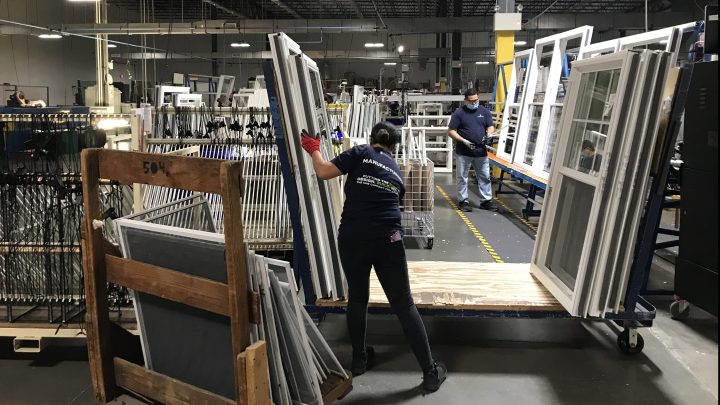
How some companies manage to profit from supply chain kinks
How some companies manage to profit from supply chain kinks

There are some companies that are flourishing right now because they don’t rely on the clogged supply chain. While they’re not immune to this global logistics nightmare, these firms have managed to minimize their exposure and are using it as a selling point. They’re not just weathering the supply chain storm, they’re profiting from it.
About a month ago, Thompson Creek Window Co., a midsize Maryland firm, started running this ad: “Thompson creek does it all — design, build and install — which means no supply chain delays like other window dealers.”
Thompson Creek is headquartered in Upper Marlboro, in the greater Washington, D.C., area. CEO Rick Wuest said the company got the idea for the supply chain ads at a marketing meeting a few months into the pandemic.
They realized that having their own factory and sourcing 90% of raw materials in the U.S. was a distinct advantage and selling point, especially for consumers with an immediate window problem.
“We can solve it in five weeks, or, you know, you can call the other guy and six months from now they’ll be out,” Wuest said.
And Wuest said the message is getting through — this year, business is up 40% so far. “We saw that opportunity and seized the window of opportunity. Plenty of pun intended.”
Thompson Creek’s offices and customer service department are on one side of a door, which Wuest opened to reveal rows and rows of white, vinyl strips waiting to be cut and finished in saws and sanders. Wuest told me they buy their bulky raw materials, like vinyl and glass, domestically. And at the start of the pandemic, they managed to stockpile some of the small parts they do import, such as window locks.
Other, very different kinds of companies are also working this supply chain advantage. Like Atlanta-based Veritiv, which designs and sells packaging materials.
Like Thompson Creek, Veritiv gets about 90% of its materials from American suppliers. Dan Calderwood, a senior vice president at Veritiv, said that’s a real selling point for desperate customers who can’t get shipping supplies right now. Veritiv works with companies that need to redesign their packaging around raw materials they can get in the U.S.
“Our phones have been ringing off the hook with customers saying, ‘I can’t get the packaging I need for my holiday orders.’ So we’ve been really active around that recently,” Calderwood explained.
And it’s paid off. Calderwood said sales were up about 11% through the third quarter of this year. Even companies that don’t rely on the supply chain for their products still need packaging.
Those companies include Tradesy, a peer-to-peer website connecting buyers and sellers of secondhand luxury clothing and accessories. Tradesy ran short of the recycled boxes it uses. But at least the stuff it sells comes from people’s closets, not the clogged supply chain.
“And many of our sellers have put in their listings and in their seller profiles how quickly they ship and assurances to buyers that they have the product and there won’t be any supply chain issues,” said founder and CEO Tracy DiNunzio.
DiNunzio said customers are responding, and gift sales are up 66% over last year. She added that almost a quarter of the messages between Tradesy buyers and sellers last month mentioned shipping times and/or the supply chain.
There’s a lot happening in the world. Through it all, Marketplace is here for you.
You rely on Marketplace to break down the world’s events and tell you how it affects you in a fact-based, approachable way. We rely on your financial support to keep making that possible.
Your donation today powers the independent journalism that you rely on. For just $5/month, you can help sustain Marketplace so we can keep reporting on the things that matter to you.











